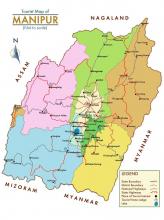-
India’s forest land which is rich in natural resources, like forest derivatives and minerals is undoubtedly the cauldron of various degrees of conflicts. From civil wars in Chhattisgarh to armed conflict in North East, it has created internal security more volatile than ever before in India. The Union Ministry of Home Affairs has a special wing to neutralise this ‘internal security’ with strong policing. The growing number of incidents of conflicts in the forest area have threatened the forest resources as well the livelihood of inhabitants.
-
The fall of Red Mosque (Lal Masjid) has certainly heralded a new era in Pakistan marked by conflict between moderate and fundamentalist forces.
-
The docking of the USS Nimitz in Chennai port has challenged India’s independent foreign policy and its long-lasting tradition against imperialism, colonialism, and superpower hegemony. Supporters of Nimitz’s brief visit who praise it as a testimony to bourgeoning Indo-US strategic relationship should acknowledge the long drawn coercive history of Nimitz nuclear ship and the use of ‘gunboat diplomacy’ to restore US’ imperialistic interests.
-
One of the most dreaded terrorist groups in Southeast Asia, Jemaah Islamiyah (JI) is presently facing a leadership crisis. The arrest of two of its most prominent leaders, Abu Dujana and Zarkasih (also known as Yusron Mahmudi and Abu Irsyad respectively) has jeopardized JI’s future plans in the region. Of late, JI has faced the wrath of the anti–terrorist initiatives by the Indonesian government duly supported by other Southeast Asian neighbours as well as Australia.
-
The fundamental cultural influences [mentioned in the first part of the article, “Negotiating with China-I”, Article No:120, June 14, 2007], have left their imprint upon the negotiating style of the Chinese. Scholars like John Graham and Mark Lam (The Chinese Negotiation. Harvard Business Review, October 2003) have identified and defined a set of eight elements that one would have to contend with when dealing with the Chinese.
-

Contesting claims over territorial supremacy by rival insurgent groups have not only resulted in a violent conflict between the insurgents’ themselves but, it also has the potential to generate misunderstanding between communities they claim to represent. This is exactly the present state of affairs in India’s northeastern state of Manipur where several such groups have turned this beautiful land into their fiefdom.
-
After four decades of a political standoff, the recent thaw in Sino-Indian relations has seen a renewal of dialogue and the start of substantive negotiations between the two countries. But negotiating with the Chinese – the inscrutable Orientals, as the Europeans called them – requires a very different set of sensitivities and skills to what we Indians are accustomed. Our negotiating skills have largely been limited to Americans, Europeans and West Asians who are distinctly more transparent, open and non-contextual in their negotiations than the Chinese or the traditional Japanese.
-
Like in any nuclear weapon state, multiple vulnerabilities exist in a nuclear weapons complex. In the case of Pakistan, it is possible that groups or individuals may violate security rules for a variety of reasons, including profit making, settling a vendetta, or religious or ideological motives. Rogue elements may try to gain control over sensitive items for their own use or to transfer these items to another state or to other non-state actors for financial or ideological reasons.
-
The Cold War mindset is difficult to fade away. With the announcement of designing and building the nuclear energy centre in Myanmar by Russia’s Federal Atomic Energy Agency, the US has raised concerns about the peaceful nature of Myanmar’s nuclear energy programme. The proposed 10 megawatt light water reactor has attracted international attention to Myanmar. The negotiation for acquiring the nuclear technology between Russian Agency and Myanmar was shelved since 2003 due to certain payment problems.
-
May 18 (Friday) terror blast at Mecca Mosque in Hyderabad reveals the persistent challenge of terrorist groups to foment violence and communal acrimony in India. The blast that took nine lives and injured more than 50 people, occurred during Friday prayers inside the historical Mecca Mosque located near the well-known Charminar, a major landmark of the City that attracts several tourists from India and abroad. The police also recovered three more bombs in the mosque and defused it.
Paxton ported to drupal by DropThemes.in